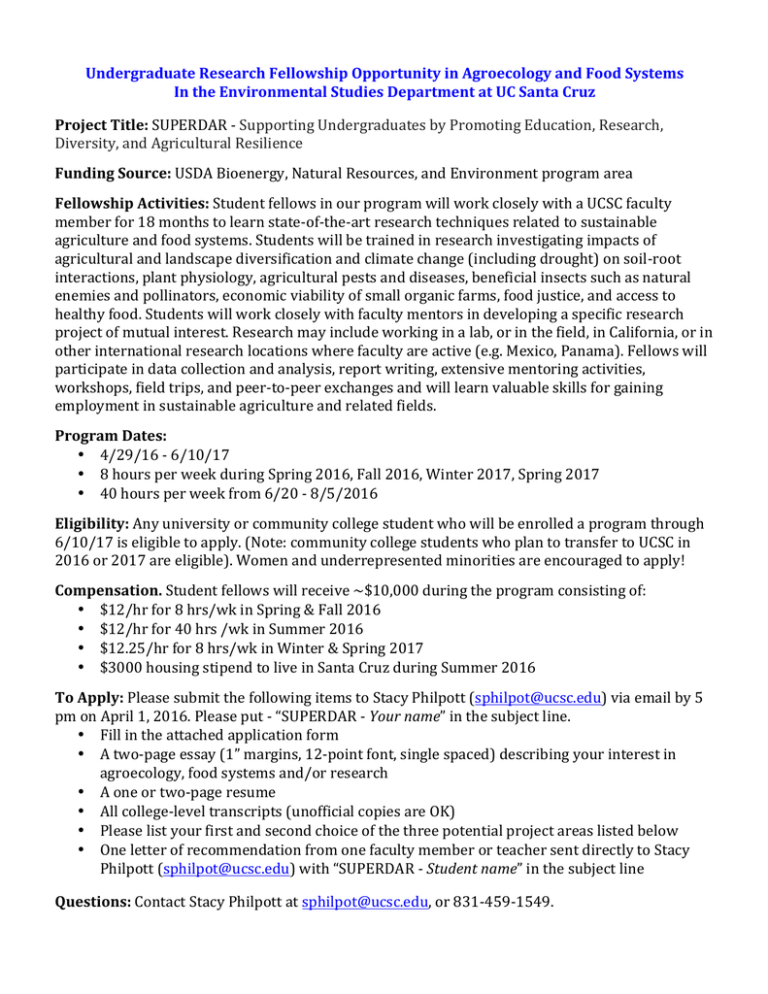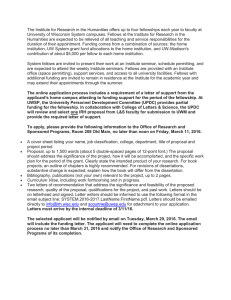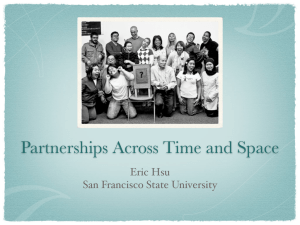Document 14297129
advertisement

Undergraduate Research Fellowship Opportunity in Agroecology and Food Systems In the Environmental Studies Department at UC Santa Cruz Project Title: SUPERDAR -­‐ Supporting Undergraduates by Promoting Education, Research, Diversity, and Agricultural Resilience Funding Source: USDA Bioenergy, Natural Resources, and Environment program area Fellowship Activities: Student fellows in our program will work closely with a UCSC faculty member for 18 months to learn state-­‐of-­‐the-­‐art research techniques related to sustainable agriculture and food systems. Students will be trained in research investigating impacts of agricultural and landscape diversification and climate change (including drought) on soil-­‐root interactions, plant physiology, agricultural pests and diseases, beneficial insects such as natural enemies and pollinators, economic viability of small organic farms, food justice, and access to healthy food. Students will work closely with faculty mentors in developing a specific research project of mutual interest. Research may include working in a lab, or in the field, in California, or in other international research locations where faculty are active (e.g. Mexico, Panama). Fellows will participate in data collection and analysis, report writing, extensive mentoring activities, workshops, field trips, and peer-­‐to-­‐peer exchanges and will learn valuable skills for gaining employment in sustainable agriculture and related fields. Program Dates: • 4/29/16 -­‐ 6/10/17 • 8 hours per week during Spring 2016, Fall 2016, Winter 2017, Spring 2017 • 40 hours per week from 6/20 -­‐ 8/5/2016 Eligibility: Any university or community college student who will be enrolled a program through 6/10/17 is eligible to apply. (Note: community college students who plan to transfer to UCSC in 2016 or 2017 are eligible). Women and underrepresented minorities are encouraged to apply! Compensation. Student fellows will receive ~$10,000 during the program consisting of: • $12/hr for 8 hrs/wk in Spring & Fall 2016 • $12/hr for 40 hrs /wk in Summer 2016 • $12.25/hr for 8 hrs/wk in Winter & Spring 2017 • $3000 housing stipend to live in Santa Cruz during Summer 2016 To Apply: Please submit the following items to Stacy Philpott (sphilpot@ucsc.edu) via email by 5 pm on April 1, 2016. Please put -­‐ “SUPERDAR -­‐ Your name” in the subject line. • Fill in the attached application form • A two-­‐page essay (1” margins, 12-­‐point font, single spaced) describing your interest in agroecology, food systems and/or research • A one or two-­‐page resume • All college-­‐level transcripts (unofficial copies are OK) • Please list your first and second choice of the three potential project areas listed below • One letter of recommendation from one faculty member or teacher sent directly to Stacy Philpott (sphilpot@ucsc.edu) with “SUPERDAR -­‐ Student name” in the subject line Questions: Contact Stacy Philpott at sphilpot@ucsc.edu, or 831-­‐459-­‐1549. Potential project areas for Summer 2016: Climate Impacts on Crop Productivity: Climate change will increase the frequency and duration of droughts and their impacts on agricultural productivity in the arid and semi-­‐arid western United States. Fellows working in the “Climate Impacts on Crop Productivity” area will examine how drought impacts plant productivity in grasslands and rangelands of California. Fellows will participate in experimental manipulative experiments and gradient analyses to test hypotheses about impacts of drought on soil moisture, root biology, photosynthesis, and plant production. Students will get hands-­‐on training in state-­‐of-­‐the-­‐art methods of infrared gas analysis, micrometerology, and drone technology to measure thermal radiation and reflectance spectroscopy of ecosystems during drought. Data will be used to parameterize the Land Surface Model to develop transformative new knowledge about how energy fluxes are coupled with the movement of carbon dioxide into plant canopies for photosynthesis, and water loss from ecosystems. Fellows will meet with US Forest Service and USDA Extension specialists, and communicate their results for public outreach via social media. Student participants will gain a better understanding of how measurements in the field can improve modeling capacity and outreach to stakeholders. Biodiversity and Ecosystem Services – Predation and pollination typically increase with abundance of natural enemies and pollinators, but relationships between species richness and services are tenuous. Yet, more can be learned about agroecosystem characteristics (e.g. vegetation, ground cover, landscape surroundings) that promote biological control and pollination. Fellows working in the “Biodiversity and Ecosystem Services” area will join a vibrant group of graduate students and undergraduates to investigate relationships between taxonomic and functional diversity of beneficial insects in urban or tropical agroecosystems. Specifically, fellows may: (1) study predation services provided by ladybeetles, ants, birds or bats in urban agroecosystems in Central California, (2) examine relationships between local and landscape features of urban agroecosystems and predation, parasitism, and pollination services, or (3) study ecological interactions between beneficial insects, birds, and shade tree management in coffee farms in Chiapas, Mexico. Food Security and Health: Fellows working in the “Food Security and Health” area will work with educators, community advocates, and families in the Pajaro Valley and California to learn about healthy food and a sustainable, just food systems. Fellows may work with UCSC and high school students in UCSC Everett Program’s Youth Empowerment Institute (YEI) aimed at providing an integrated and holistic approach to understanding the food system. By confronting issues on all fronts with multiple partners (including Food What?! [http://www.foodwhat.org] and the Food Chain Workers Alliance [http://foodchainworkers.org/]), YEI aims to build a culture of food consciousness among youth leader participants. Youth will incorporate this knowledge into a simple, entertaining quiz-­‐type mobile app game. This app will be written in the voices of Pajaro Valley youth themselves—predominantly Latino with close ties to the food production and processing industries that shape their lives. Fellows could explore the interplay between poverty, food production, food insecurity, and health and use this information to develop strategies for including local youth in support of better, healthier, and more socially just local food systems.





